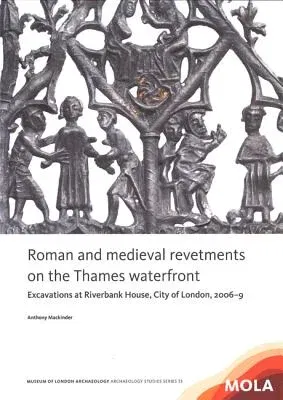Archaeological investigations were carried out in 2006-9 on the north
bank of the River Thames at Riverbank House, City of London, just
upstream of the modern London Bridge and its medieval predecessor, in
the heart of the medieval port. An extensive watching brief had taken
place on the site in the early 1980s (the Swan Lane car park), but these
new excavations were in undisturbed areas around the perimeter. A
2nd-century AD revetment and part of the late Roman riverside wall were
recorded, while a sequence of timber revetments, some dated by
dendrochronology, witness the growth of the medieval port from the 12th
to the 15th centuries. Fragmentary building remains relate to medieval
and post-medieval tenements, and pipes from a 16th- or 17th-century
ship's pump were found reused as a drain.
Characteristically, foreshore deposits and reclamation dumps infilling
the medieval waterfronts produced many well-preserved finds,
particularly leather and metal objects. The latter include tools,
domestic items, cloth seals and a number of religious and secular
badges. A rare and unusual find was a devotional openwork panel relating
to the life and death of Thomas, Earl of Lancaster, who was executed on
23 March 1322 by Edward II. Remains of plants used in dyeing support the
documented importance of the local cloth-finishing industry.

